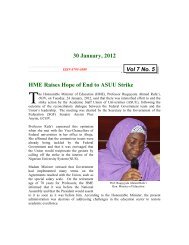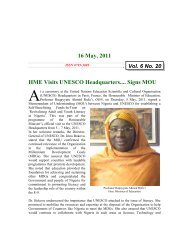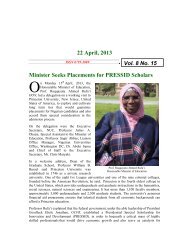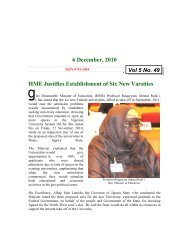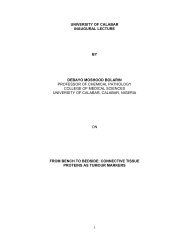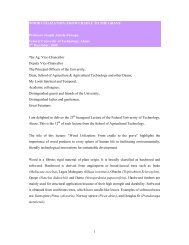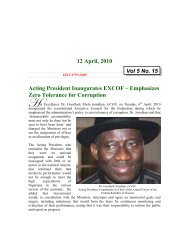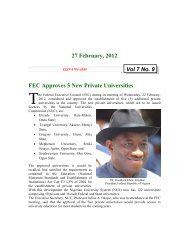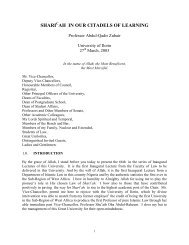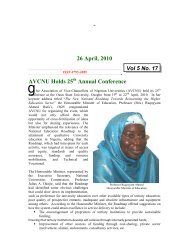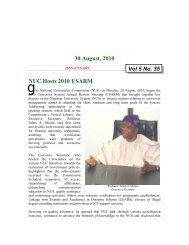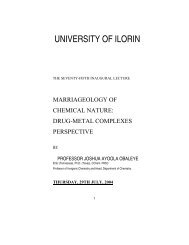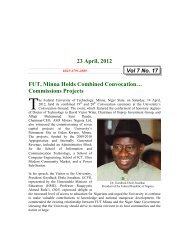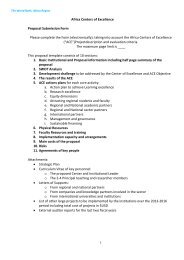From State And State Power To Man And Social - National ...
From State And State Power To Man And Social - National ...
From State And State Power To Man And Social - National ...
Create successful ePaper yourself
Turn your PDF publications into a flip-book with our unique Google optimized e-Paper software.
association with the EEC was of little benefit to Nigeria. Also, from the political and diplomaticperspectives, Nigeria’s association with the EEC was of doubtful value to her; it did not enhanceher leadership position in Africa. Nigeria’s leadership of the African, Caribbean and Pacificcountries, was harmful to her vanguard role in creating solidarity among all Third Worldcountries; it was also, in the long run, unhelpful in advancing the interests of West Africanintegration.[Africa Development/Afrique et Develppement]1990. Decision-making Models Re-visited.In 1990, I rounded up my exploration of the theme of decision-making process, with theoreticalmodeling and taxonomy that provided the methodological foregrounding for a large and popularvolume on the structure and processes of foreign policy-making and implementation in Nigeria.It was my attempt to forge a unity between crude empiricism and theoretical or methodologicalrigor. As the first chapter of a book edited by Olusanya, the Director-General of the NigerianInstitute of International Affairs, and Akindele, the Director of Research and Studies, on theStructure and Processes of Foreign Policy Decision-Making and Implementation in Nigeria, mycontribution was meant to provide the theoretical setting for the rest of the twenty-nine chapters.I, therefore, appropriately began with an overview of the literature on Nigeria’s foreign policy. Ilamented that, in qualitative terms, the study of Nigeria’s foreign policy was grossly underdeveloped,even though, in quantitative terms, writing on Nigeria’s foreign policy had become averitable productive industry. The study of Nigeria’s foreign policy was underdeveloped inseveral senses. First, the ‘industry’ lacked forward and backward linkages: the writings werehardly based on empirical research, and the few efforts at research were not guided by consciousand explicit use of foreign policy or international relations theories, models, or paradigms.Second, I observed that the prolific factories on Nigeria’s foreign policy had, by and large, failedso far to create an impetus for the advancement of propositions of sufficiently high level ofgeneralization, internal consistency and logical rigour, to form the basis for either testing existingtheories or fresh theorizing on foreign policy. Rather, the studies on Nigeria’s foreign policy hadbeen idiosyncratic in nature; each writer or researcher on foreign policy had pursued his/her owntheme and gone on as if no previous work had been done on the theme. Consequently, the studieson Nigeria’s foreign policy were not cumulative, with one writer or researcher building on theworks of his colleagues, each drawing from and advancing existing knowledge on a givensubject of inquiry. Third, as a deliberate and conscious form of activity, data-making was hardlypart of the result of research efforts on Nigeria’s foreign policy. The gathering of evidence wasdone in a half-hazard, unmethodical manner; it was not directed towards validating some testablehypothesis or even the solving of clearly posed practical and theoretical problems.The book to which my contribution was an introduction was meant to fill the gap in the literatureon the subject. <strong>To</strong> support these observations, I presented a critical summary of samples ofwritings on Nigeria’s foreign policy, identifying their strengths and major weaknesses. I thenproceeded to summarize the principal foreign policy decision-making models, classifying themaccording to paradigmatic taxonomies. In doing so, I postulated three sets of arguments. First, Inoted that, as an explicit theoretical or methodological enterprise, the development of foreignpolicy decision-making models was part of the behaviouralist revolution, and that it madesignificant contributions to the scientific study of foreign policy. Second, I contended that, as ageneral approach to the study of foreign policy, however, decision-making analysis spanned12



